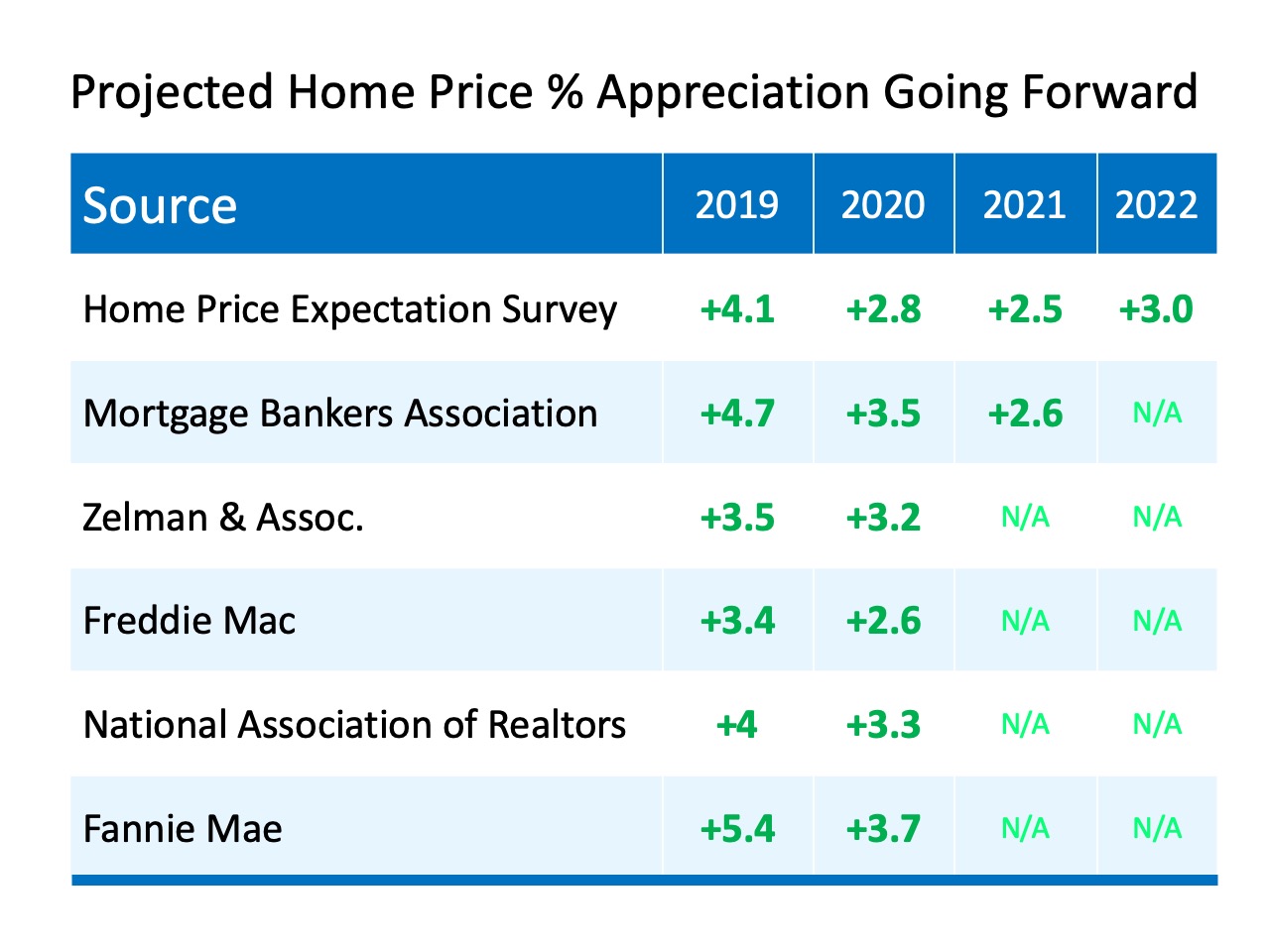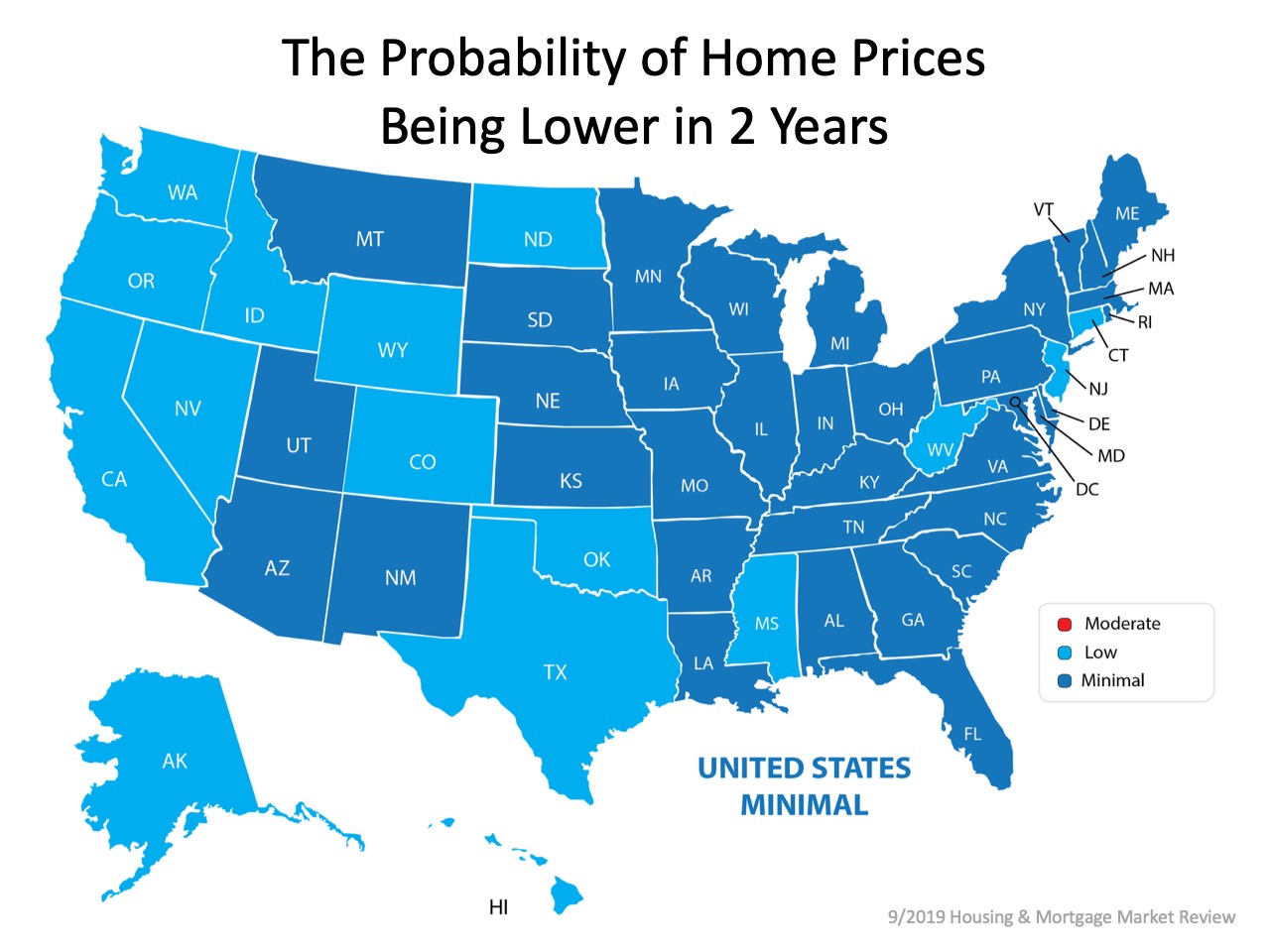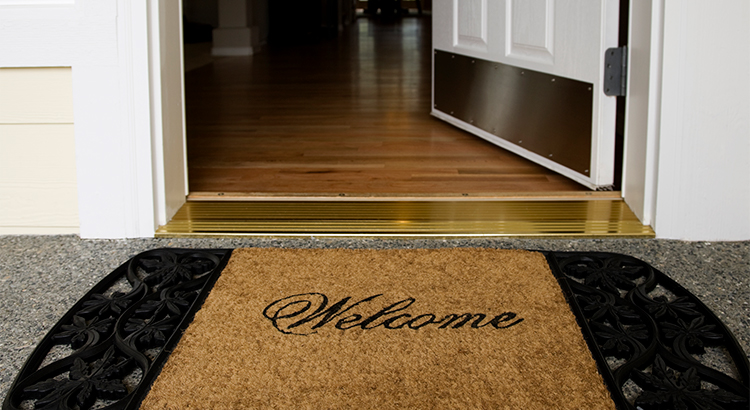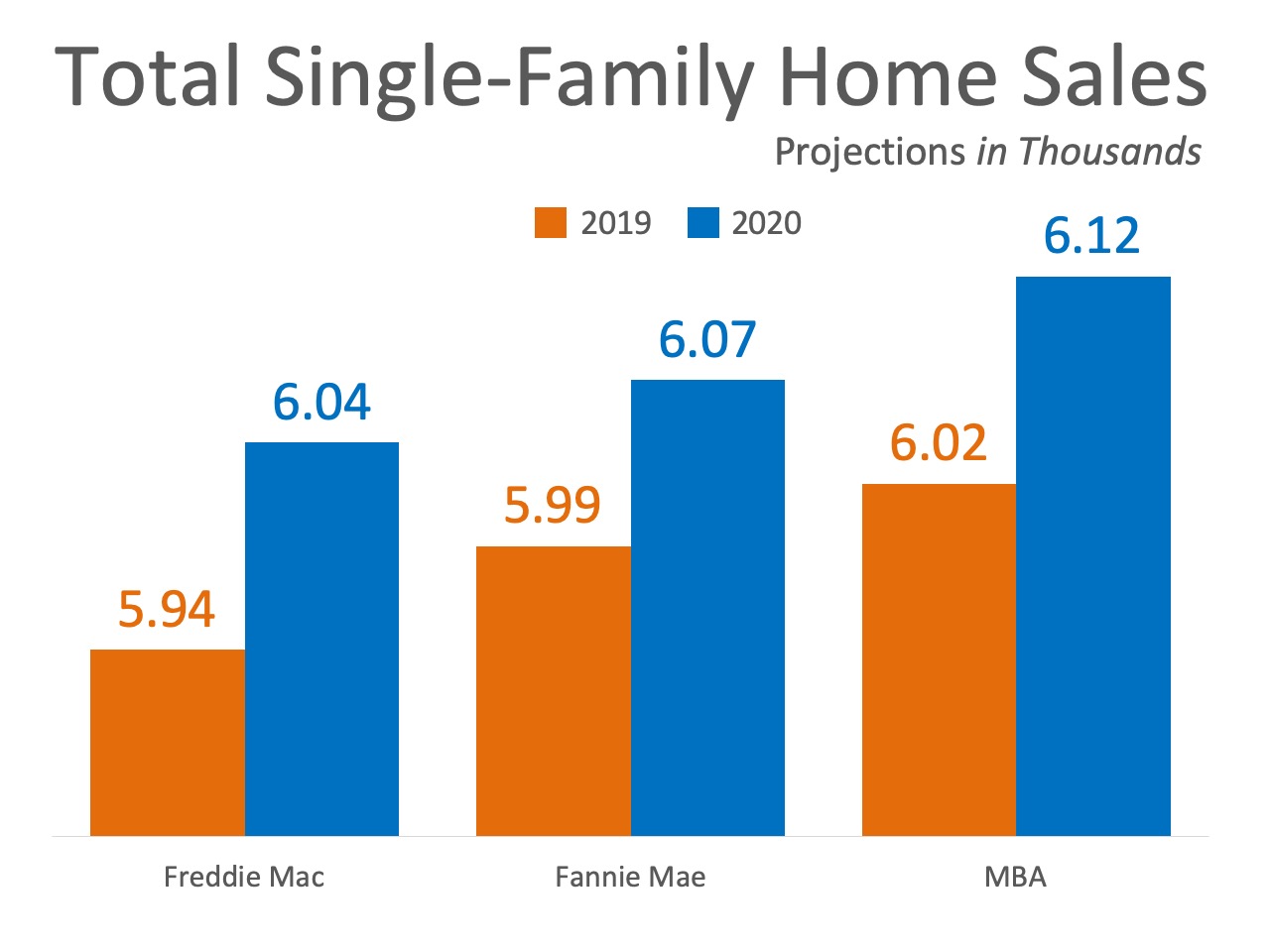Market Trends and Insights For Home Buyers and Homeowners.
Thursday, September 12, 2019
What Is the Probability That Home Values Sink?
What Is the Probability That Home Values Sink?

With the current uncertainty about the economy triggered by a potential trade war, some people are waiting to purchase their first home or move-up to their dream house because they think or hope home prices will drop over the next few years. However, the experts disagree with this perspective.
Here is a table showing the predicted levels of appreciation from six major housing sources: As we can see, every source believes home prices will continue to appreciate (albeit at lower levels than we have seen over the last several years). But, not one source is calling for residential real estate values to depreciate.
As we can see, every source believes home prices will continue to appreciate (albeit at lower levels than we have seen over the last several years). But, not one source is calling for residential real estate values to depreciate.
 As we can see, every source believes home prices will continue to appreciate (albeit at lower levels than we have seen over the last several years). But, not one source is calling for residential real estate values to depreciate.
As we can see, every source believes home prices will continue to appreciate (albeit at lower levels than we have seen over the last several years). But, not one source is calling for residential real estate values to depreciate.
Additionally, ARCH Mortgage Insurance Company in their current Housing and Mortgage Market Review revealed their latest ARCH Risk Index, which estimates the probability of home prices being lower in two years. There was not one state that even had a moderate probability of home prices lowering. In fact, 34 of the 50 states had a minimal probability.

Bottom Line
Those waiting for prices to fall before purchasing a home should realize that the probability of that happening anytime soon is very low. With mortgage rates already at near historic lows, now may be the time to act.
Wednesday, September 11, 2019
Millennial Buying Power Poised to Boost Homeownership
Millennial Buying Power Poised to Boost Homeownership

In a recent article by Realtor Magazine, Mark Fleming, Chief Economist of First American Financial Corporation, notes,
“The largest group of millennials by birth year will turn 30 in 2020, which puts them entering their prime homebuying years”.
The article continues to describe how millennials have more buying-power than the generations that preceded them, making their interest in embracing homeownership stronger than ever,
“Millennials—the most educated generation—have the highest incomes across their generational cohorts, even when salaries are adjusted for inflation.”
This combination of power and desire has the potential to drive positive growth in the homeownership rate heading into the near future. According to Fleming,
‘“The gap between the potential and actual homeownership in 2018 narrowed slightly as the growth in homeownership modestly exceeded the increase in potential demand,” he says, citing First American’s Homeownership Progress Index.“We expect the homeownership rate to further close the gap with potential in the years ahead as millennials continue to make important decisions, such as attaining an education and, later in life, getting married and having children.”’
That said, the shortage of sellable inventory in the entry and mid-range levels that’s attractive to potential millennial buyers may be a contributing factor as to why many millennials haven’t yet purchased a home. According to another recent report citing Frank Martell, President and CEO of CoreLogic,
“Lower rates are certainly making it more affordable to buy homes and millennial buyers are entering the market with increasing force. These positive demand drivers, which are occurring against a backdrop of persistent shortages in housing stock, are the major drivers for higher home prices, which will likely continue to rise for the foreseeable future.”
With millennials aging-up into mortgage-ready and home-buying territory, along with their strong buying interest and buying power, this generation is poised and ready to have positive impact on homeownership rates across the country. Many of them just need to find a home they're excited to buy in this competitive end of the market.
Bottom Line
If you’re thinking of selling, let’s connect and determine if now is a great time for you to list your house and move-up. More millennials are getting ready to jump into the market and join the ranks of homeownership, so demand for homes in the starter and mid-level range will continue to be strong.
Tuesday, September 10, 2019
The Role Access Plays in Getting Your House Sold
The Role Access Plays in Getting Your House Sold

So, you’ve decided to sell your house. You’ve hired a real estate professional to help you with the entire process and you’ve been asked what level of access you want to provide to potential buyers.
There are four elements to a quality listing. At the top of the list is Access, followed by Condition, Financing, and Price. There are many levels of access you can provide to your agent to be able to show your home.
Here are five levels of access you can provide to a buyer, each with a brief description:
- Lockbox on the Door – This allows buyers the ability to see the home as soon as they are aware of the listing, or at their convenience.
- Providing a Key to the Home – Although the buyer’s agent may need to stop by an office to pick up the key, there is little delay in being able to show the home.
- Open Access with a Phone Call – The seller allows showing with just a phone call’s notice.
- By Appointment Only – Example: 48-hour notice. Many buyers who are relocating for a new career or promotion start working in that area prior to purchasing their home. They often like to take advantage of free time during business hours (such as their lunch break) to view potential homes. Because of this, they may not be able to plan their availability far in advance or may be unable to wait 48 hours to see the house.
- Limited Access – Example: the home is only available for a couple of hours a day. This is the most difficult way to be able to show your house to potential buyers.
In a competitive marketplace, access can make or break your ability to get the price you are looking for, or even sell your house at all.
Monday, September 9, 2019
Home Sales Expected to Continue Increasing In 2020
Home Sales Expected to Continue Increasing In 2020

Freddie Mac, Fannie Mae, and the Mortgage Bankers Association are all projecting home sales will increase nicely in 2020.
Below is a chart depicting the projections of each entity for 2019, as well as for 2020. As we can see, Freddie Mac, Fannie Mae, and the Mortgage Bankers Association all believe homes sales will increase steadily over the next year. If you’re a homeowner who has considered selling your house recently, now may be the best time to put it on the market.
As we can see, Freddie Mac, Fannie Mae, and the Mortgage Bankers Association all believe homes sales will increase steadily over the next year. If you’re a homeowner who has considered selling your house recently, now may be the best time to put it on the market.
 As we can see, Freddie Mac, Fannie Mae, and the Mortgage Bankers Association all believe homes sales will increase steadily over the next year. If you’re a homeowner who has considered selling your house recently, now may be the best time to put it on the market.
As we can see, Freddie Mac, Fannie Mae, and the Mortgage Bankers Association all believe homes sales will increase steadily over the next year. If you’re a homeowner who has considered selling your house recently, now may be the best time to put it on the market.Friday, September 6, 2019
A+ Reasons to Hire a Real Estate Pro [INFOGRAPHIC]
A+ Reasons to Hire a Real Estate Pro [INFOGRAPHIC]
![A+ Reasons to Hire a Real Estate Pro [INFOGRAPHIC] | MyKCM](https://files.mykcm.com/2019/09/03132635/20190906-MEM-1046x1308.jpg)
Some Highlights:
- Hiring a real estate professional to help you buy your dream home or sell your current house is one of the most powerful decisions you can make.
- A real estate professional has the experience to help you confidently navigate through the entire process.
- Make sure you work with someone who knows the current market conditions and can simply and effectively explain them to you and your family.
Thursday, September 5, 2019
Everybody Calm Down! This Is NOT 2008
Everybody Calm Down! This Is NOT 2008

Last week realtor.com released the results of a survey that produced three major revelations:
- 53% of home purchasers (first-time and repeat buyers) currently in the market believe a recession will occur this year or next.
- 57% believe the next recession will be as bad or worse than 2008.
- 55% said they would cancel plans to move if a recession occurred.
Since we are currently experiencing the longest-ever economic expansion in American history, there is reason to believe a recession could occur in the not-too-distant future. And, it does make sense that buyers and sellers remember the horrors of 2008 when they hear the word “recession.”
Ali Wolf, Director of Economic Research at the real estate consulting firm Meyers Research, addressed this point in a recent interview:
“With people having PTSD from the last time, they’re still afraid of buying at the wrong time.”
Most experts, however, believe if there is a recession, it will not resemble 2008. This housing market is in no way the same as it was just over a decade ago.
Zillow Economist, Jeff Tucker, explained the difference in a recent article, Recessions Typically Have Limited Effect on the Housing Market:
“As we look ahead to the next recession, it's important to recognize how unusual the conditions were that caused the last one, and what's different about the housing market today. Rather than abundant homes, we have a shortage of new home supply. Rather than risky borrowers taking on adjustable-rate mortgages, we have buyers with sterling credit scores taking out predictable 30-year fixed-rate mortgages. The housing market is simply much less risky than it was 15 years ago."
George Ratiu, Senior Economist at realtor.com, also weighed in on the subject:
“This is going to be a much shorter recession than the last one, I don't think the next recession will be a repeat of 2008...The housing market is in a better position.”
In the past 23 years, there have been two national recessions – the dot-com crash in 2001 and the Great Recession in 2008. It is true that home values fell 19.7% during the 2008 recession, which was caused by a mortgage meltdown that heavily impacted the housing market. However, while stock prices fell almost 25% in 2001, home values appreciated 6.6%. The triggers of the next recession will more closely mirror those from 2001 – not those from 2008.
Bottom Line
No one can accurately predict when the next recession will occur, but expecting one could possibly take place in the next 18-24 months is understandable. It is, however, important to realize that the impact of a recession on the housing market will in no way resemble 2008.
Subscribe to:
Posts (Atom)